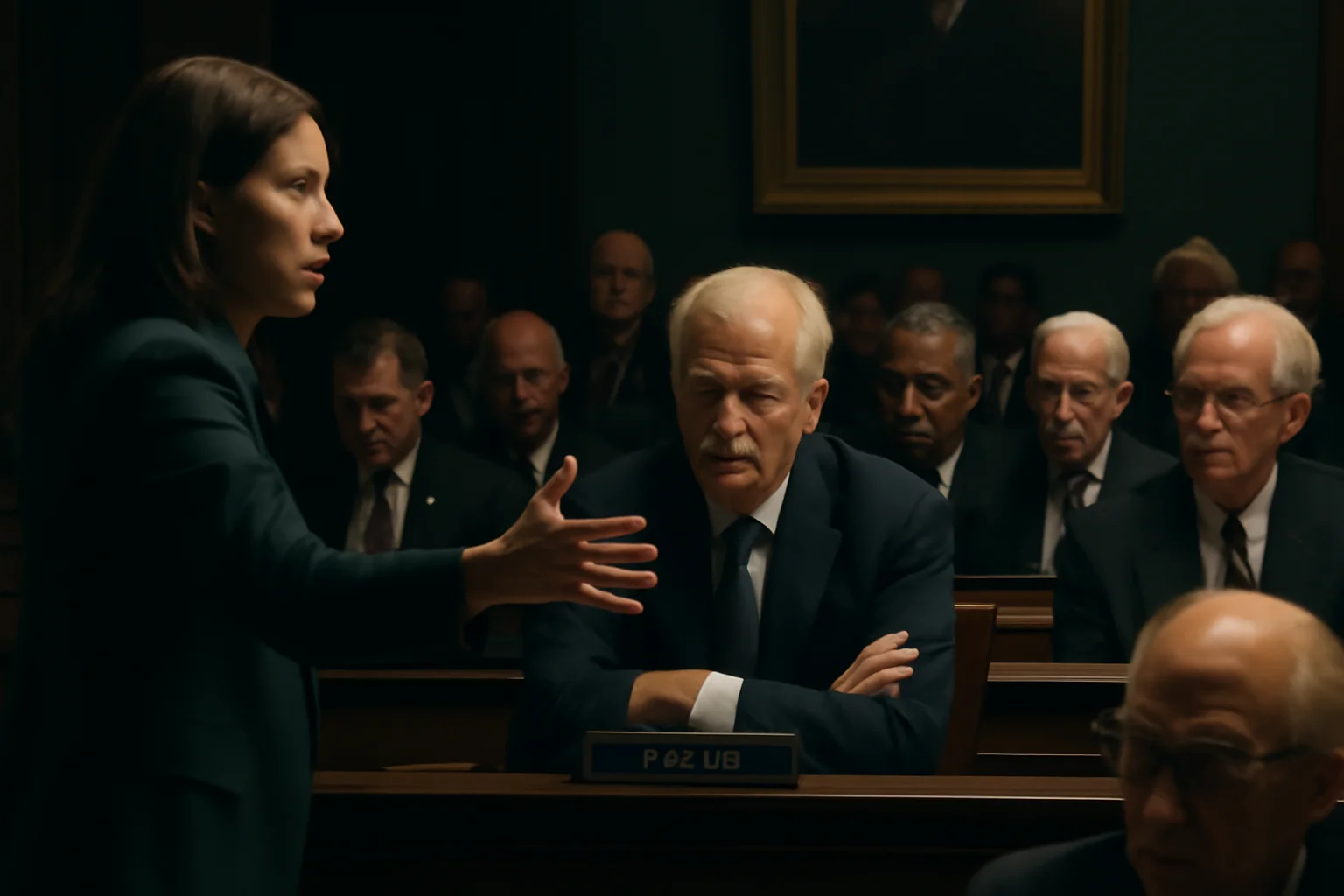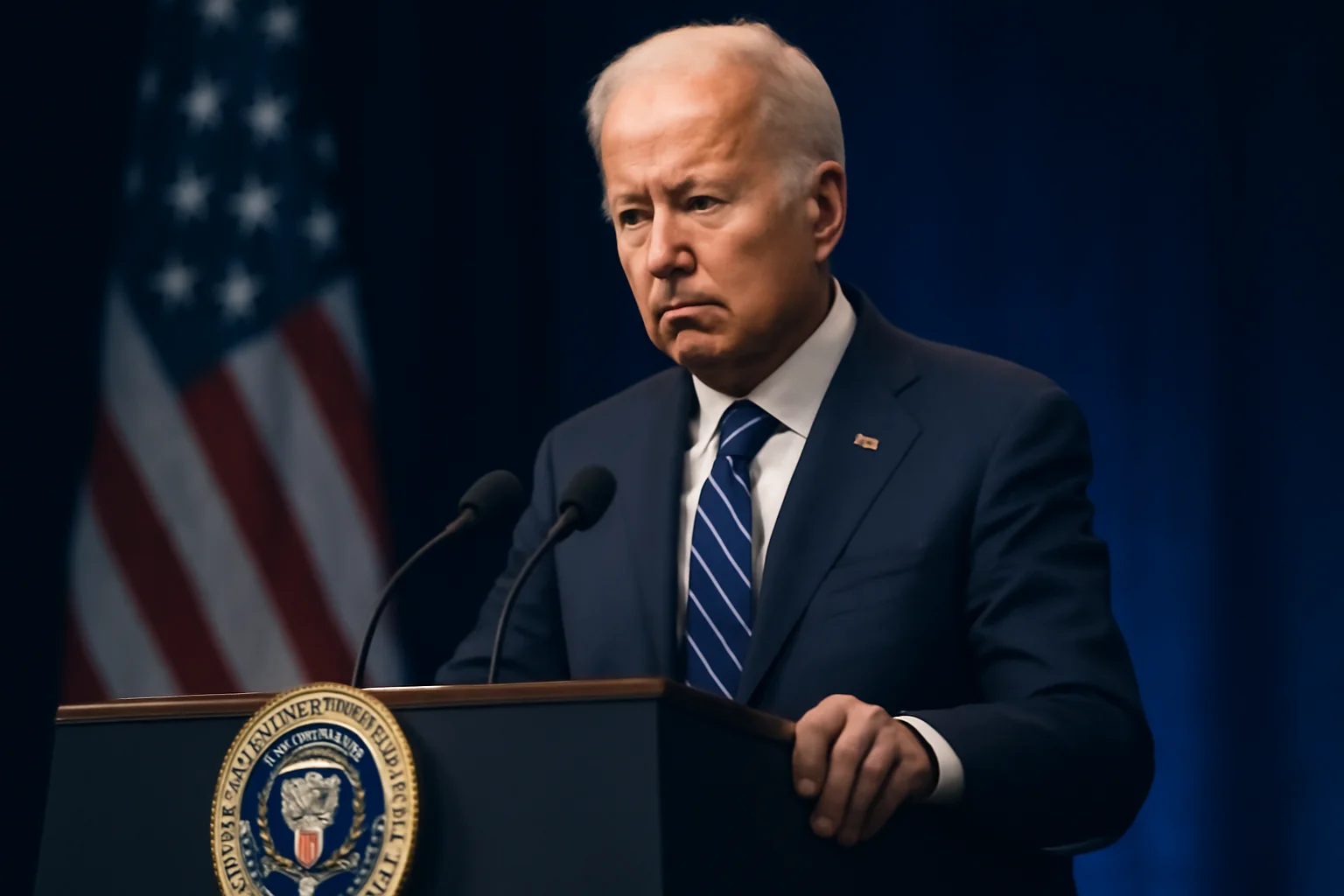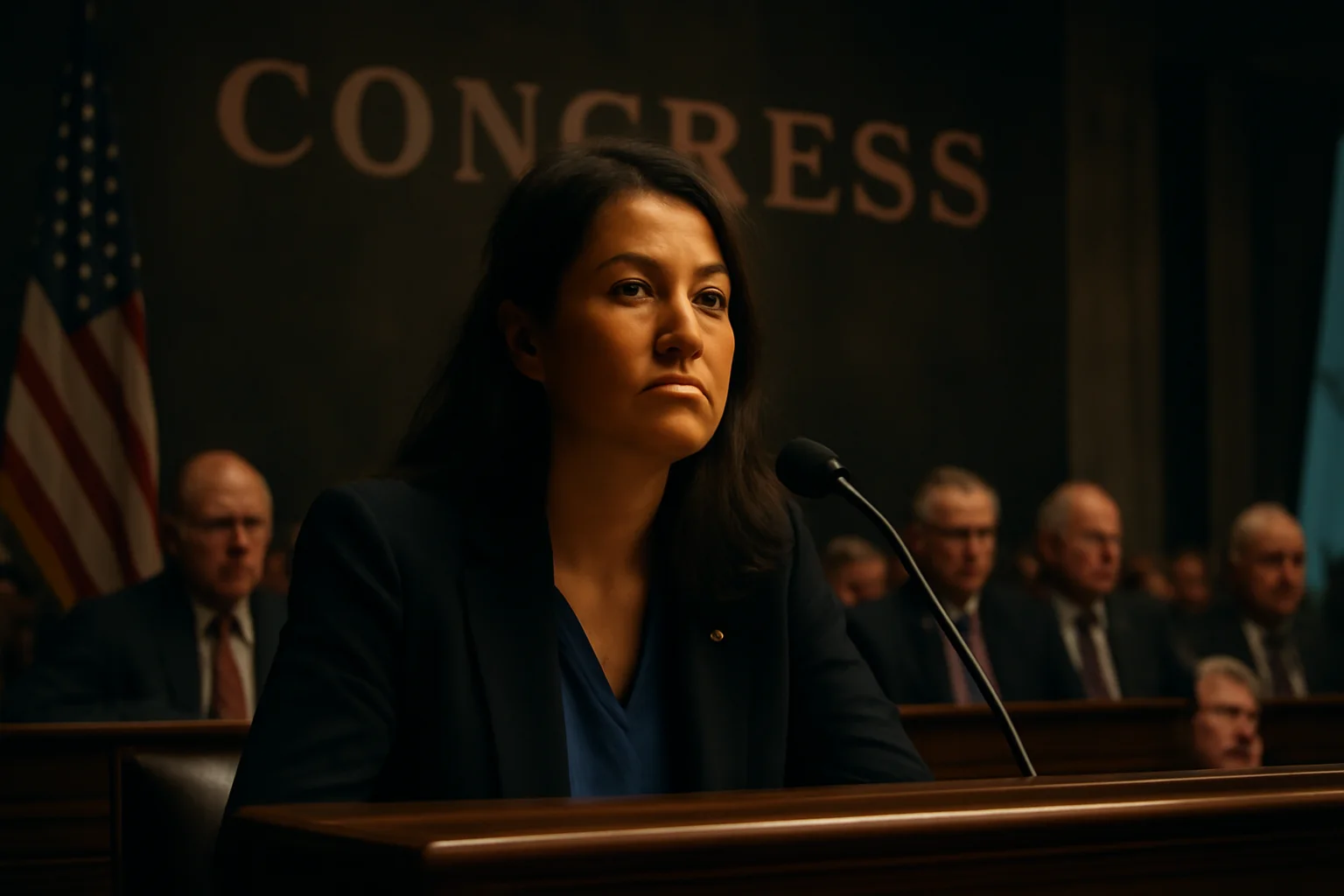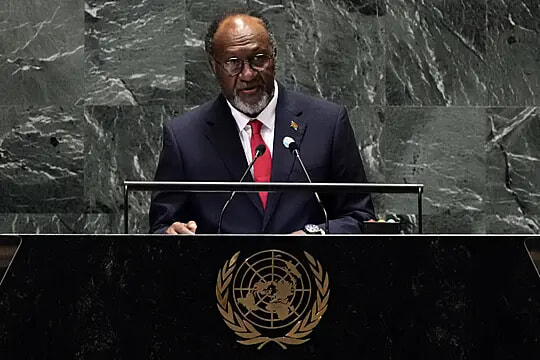
Young Democrat Wants to Force Aging Congressmen to Take Cognitive Tests
Is this a good move?
Published July 16, 2025
Advertisement
Advertisement
1. A Nation Grows Old in Power

In the shadow of the Capitol dome, America’s lawmakers are grayer and older than ever, wielding authority over a nation whose future races ahead of their lived experience. Today, the median age of a sitting U.S. congressperson is nearly 65, with Baby Boomers clutching a vast majority of Senate seats and a formidable share of the House. Citizens across the country have grown increasingly concerned, questioning whether leaders who once steered the nation now rely too heavily on the staffers beneath them, sometimes even for the smallest daily duties. In districts from Washington state to Virginia, a growing perception persists that Congress has become a gerontocracy—ruled by elders out of step with the rapid-fire pace of modern technology and policy. Cracks in the façade of certainty have spread, as voters wonder if their representatives are making vital decisions or simply rubber-stamping the work of anonymous aides. Stories swirl of aging lawmakers missing votes, struggling through committee hearings, and occasionally becoming the subject of whispered concern in the hallways of power. Each new incident of public cognitive faltering is seized upon by critics who question not only an individual’s ability but the credibility of the institution itself. Despite the discomfort these questions provoke, they refuse to fade, lingering as the backdrop to every major policy debate and every crisis in governance. This unease has spurred a new wave of calls for reform, as the electorate demands a Congress that both looks and thinks like the country it serves. Amid this backdrop of generational anxiety, one young representative’s voice has broken through the noise, refusing to let the topic be dismissed or ignored. Her name is Marie Gluesenkamp Perez, and her challenge to the status quo has ignited both hope and backlash throughout Washington.
Advertisement
2. Voice from the Younger Generation

Elected in 2022 to represent Washington’s 3rd District, Marie Gluesenkamp Perez arrived in Congress with an outsider’s candor and a mechanic’s pragmatism. Having unseated an incumbent in a district twice won by Trump, she quickly became known for voicing the concerns of everyday Americans, especially those frustrated by a government seen as distant and unresponsive. She listened closely to her constituents—farmers, tradespeople, parents, and teachers—who told her the country was being run “by a bunch of staffers” rather than the people they’d actually chosen. The erosion of trust in government wasn’t abstract; it was personal, rooted in everyday experiences of inefficiency and opacity. Marie’s message resonated because she wasn’t speaking as a career politician, but as someone who had worked with her hands and understood the stakes of getting things right. She made transparency and accountability her rallying cry, vowing to restore faith in Congress by addressing the issues that others tiptoed around. Her boldest move came when she confronted the aging leadership of Congress head-on, proposing new standards to ensure members were truly fit to serve. Marie’s crusade was about more than age—it was about a system that rewarded longevity over vitality and tradition over truth-telling. She understood that asking hard questions would make her unpopular among some colleagues, but her commitment to her district outweighed any personal discomfort. Each step she took toward reform, she did so with the backing of neighbors who wanted to know that someone in Washington was fighting for their right to be represented—not just managed. As her story unfolded, it became a test case for the future of American democracy itself.
Advertisement
3. The Silent Decline

Inside the marble halls of Congress, staffers work late into the night, drafting legislation and guiding lawmakers who, in some cases, are no longer able to lead unaided. It’s an open secret on Capitol Hill: a small but growing number of representatives and senators have quietly delegated more and more responsibility to trusted aides. Critical votes are sometimes missed, and constituent needs are addressed by proxies, all while the public remains largely in the dark about who is truly at the helm. This silent decline undermines the very principles of representative democracy, as voters lose confidence in the legitimacy of their government. Stories have emerged of influential committee chairs stepping aside from leadership only to remain in office while struggling with illness or diminished faculties. Some staffers have begun to express their concerns behind closed doors, worried that the institution’s unwillingness to address cognitive decline will result in policy errors and missed opportunities. There is no standard, no process, no neutral evaluation of a lawmaker’s ability to perform the duties they swore to uphold. These lapses have real consequences: crucial amendments are lost, oversight grows lax, and scandals erupt when the public finally learns the truth. In the absence of transparency, rumors and speculation flourish, eroding trust not just in individuals, but in Congress as a whole. The stakes are high: as technology, economics, and geopolitics become ever more complex, the demand for sharp, accountable leadership grows urgent. Marie Gluesenkamp Perez’s challenge struck a nerve precisely because she was willing to drag these uncomfortable realities into the light.
Advertisement
4. The System Fights Back

When Marie Gluesenkamp Perez presented her amendment—calling for cognitive assessments for sitting members—she knew the odds were stacked against her. The House Appropriations Committee, composed largely of lawmakers aged 60 and above, received her proposal with unease and outright skepticism. Subcommittee chairs from both parties, including David Valadao and Adriano Espaillat, dismissed the idea, insisting that regular elections already serve as a sufficient check on legislative fitness. Many in the room bristled at the prospect of their own abilities being formally evaluated, viewing the amendment as a personal attack rather than a bid for institutional reform. As the debate played out, party loyalty and professional self-preservation seemed to outweigh concern for the public good. With few allies willing to take up her cause, the amendment was swiftly voted down by a resounding voice vote, the taboo too great to break. In private conversations, some acknowledged “concerns with colleagues” but preferred to handle matters quietly, preserving dignity at the cost of transparency. The fear of setting a precedent, of shining a spotlight on mental health and aging, kept many silent or on the defensive. Despite the defeat, Marie remained undeterred, framing the backlash as further evidence that the system was overdue for a reckoning. She warned that without honest self-examination, Congress risked losing not just public trust, but its very ability to function as a co-equal branch of government. The question now was whether her call for accountability would inspire a broader movement or fade into the long history of ignored reforms.
Advertisement
5. When Age Becomes Crisis

The debate over cognitive fitness came to a head during a series of public incidents that left the country’s confidence badly shaken. Last year, Rep. Gerry Connolly of Virginia, top Democrat on the House Oversight Committee, died in office after battling cancer, leaving a critical vacancy. Freshman Rep. Sylvester Turner of Texas passed away shortly after President Trump’s joint address to Congress, his illness and absences having already raised alarms about the burden placed on aging lawmakers. Rep. Raul Grijalva of Arizona and legendary Senator Dianne Feinstein both succumbed to long illnesses, with Feinstein’s struggles with memory and focus becoming a near-constant source of anguish and debate on the Hill. Even more publicly, President Joe Biden’s disastrous debate performance against Trump in 2024 sent shockwaves through the electorate. The 81-year-old President’s faltering speech and frequent lapses forced him to withdraw from the race, replaced by Vice President Kamala Harris, who would ultimately lose to Trump in the general election. These incidents were not isolated—they became symbols of a system unable or unwilling to confront the realities of age and capacity. For every high-profile case, there were others: representatives whose decline was visible to staffers but hidden from the voters until it was too late. Public outcry grew, with voters demanding to know who was truly making decisions that would shape their lives for decades to come. In homes and town halls, the question echoed: How long could Congress afford to ignore the elephant in the room? Marie Gluesenkamp Perez’s crusade now seemed less like a radical outlier and more like an urgent necessity.
Advertisement
6. A Case for Change

Marie Gluesenkamp Perez returned to her district to find her message had struck a deep chord among voters. Her constituents understood the stakes—many had lived through similar challenges in their families, deciding when to take away the keys or delegate responsibility to someone younger. She framed the debate not as an attack on elders, but as an act of respect: ensuring representation remained effective for all, regardless of age. Marie’s proposal called for the Office of Congressional Conduct to develop a clear, impartial standard for assessing a lawmaker’s ability to serve “unimpeded by significant irreversible cognitive impairment.” The goal was not to single out individuals, but to establish a transparent process that would restore public confidence. Marie pointed out the irony: Congress regulates everything from gifts to the color of hats, yet has no standard for mental fitness, despite the immense power held by its members. She argued that a failure to act would erode democracy, leaving vital decisions in the hands of the unelected or incapable. The new standard, she insisted, would help voters make informed choices while giving staffers and families a way to address decline with dignity. Marie also supported broader reforms—like term limits—but believed that systemic transparency must come first. Her advocacy highlighted the difference between respect for experience and blind allegiance to tenure, urging Congress to build a body of all ages and backgrounds. The fight for reform, she realized, would be long, but every conversation moved the country closer to an honest reckoning.
Advertisement
7. The Human Toll

The deaths of sitting lawmakers—eight since 2022—left families, staffers, and districts grappling with both personal loss and political uncertainty. For many constituents, the passing of a representative meant months without true representation as special elections were arranged and new leaders learned the ropes. Staffers often shouldered the emotional burden, managing both their grief and the work of government with little guidance or support. Some families made the difficult decision to remove loved ones from public life quietly, while others endured the media glare and speculation about their relative’s abilities. The issue was not just about the aged; some younger lawmakers, too, struggled with illness or injury, forcing the country to confront uncomfortable truths about leadership and vulnerability. Marie’s campaign for cognitive standards became a rallying point for those who had watched loved ones decline, seeing in her message a path to compassion and accountability. In the public sphere, the deaths and resignations became reminders that no one, no matter how powerful, is immune to the passage of time. Districts affected by these changes faced a special challenge, as constituents waited for new voices while grappling with the legacy of those who had served. The loss of experienced lawmakers left gaps in institutional memory, sometimes slowing the legislative process or shifting the balance of power unexpectedly. Yet each story of transition, pain, and recovery revealed the resilience of the American system—and the need to modernize its practices for a new era. The process of grief, Marie argued, could be made less traumatic if the institution had the tools to address decline openly and humanely.
Advertisement
8. Opposition, Denial, and Quiet Allies

Marie’s amendment may have failed, but it sparked a broader conversation across party lines and committee rooms. Some lawmakers remained staunchly opposed, framing the issue as an insult to their generation and a slippery slope toward discrimination. They argued that elections, held every two years, provided a regular and sufficient check on anyone unfit to serve. Others worried about setting a dangerous precedent, fearing that cognitive standards could be weaponized for political gain. But in the shadows, quiet allies began to emerge—staffers, younger representatives, and even some senior members who recognized the cost of denial. They started to discuss new proposals, ranging from voluntary cognitive testing to peer review systems that would protect both dignity and democracy. Media coverage and public polling showed that voters were paying attention, demanding action rather than platitudes. Across the country, editorial boards and advocacy groups debated the merits and challenges of reform, adding fuel to the growing movement. Marie continued to meet with colleagues, seeking common ground and practical solutions, never losing sight of the people she represented back home. Each small victory—a conversation, a new ally, a media story—chipped away at the resistance, setting the stage for bigger changes ahead. The echo of Marie’s rebellion now rang throughout the Capitol, reminding all who served there that time would not wait for reform.
Advertisement
9. Systemic Reform: What Comes Next

The debate over cognitive standards is only one part of a larger fight over the future of American self-government. Marie and her supporters argue that systemic transparency and accountability must become the pillars of a modern Congress. They envision a legislative body where age and experience are honored, but not shielded from scrutiny or honest evaluation. The reforms on the table now include term limits, enhanced ethics rules, and mechanisms to ensure that the people driving national policy are both capable and accountable. Marie’s work has inspired a new generation of lawmakers and activists, many of whom see her courage as a blueprint for tackling other entrenched problems. Some proposals suggest creating independent panels of medical professionals to assess members’ cognitive health, while others call for greater public disclosure of health issues affecting officeholders. Critics still warn of overreach, insisting that the balance between privacy and public interest is delicate and must be maintained. But the national conversation has shifted, and the taboo is beginning to fade in the face of mounting evidence and public demand. The path to change will not be quick or easy—every institution resists examination of its own weaknesses—but the seeds have been planted. For now, Marie continues her fight, confident that, with time and persistence, the system can be reformed without sacrificing its core values. The question before the country is no longer whether to act, but how soon change will come—and who will lead the charge.
Advertisement
10. The Price of Inaction

If Congress fails to reform itself, the consequences may be felt for generations to come. Unchecked decline in leadership can undermine national security, economic stability, and the very foundation of American democracy. The stories of faltering lawmakers and missed opportunities will continue to erode trust, discouraging civic engagement and fueling cynicism. The next crisis—whether foreign or domestic—may find the country unprepared, led by those unable to rise to the challenge. Marie Gluesenkamp Perez’s crusade serves as both a warning and a call to action: a reminder that every democracy must renew itself to survive. The risks of denial are greater than the discomfort of honest debate; the future demands leaders who are as capable as they are dedicated. Reform will require courage—from lawmakers, voters, and the staffers who keep the wheels turning behind the scenes. In the end, the story of Congress’s aging membership is not just about age, but about the willingness to confront hard truths and build a better system. Marie’s voice—echoing through committee rooms, media interviews, and town halls—reminds us that accountability is not an insult, but a mark of respect. Only by embracing transparency and change can Congress hope to regain the confidence of the people it serves. The time for action is now, before history writes the next chapter in the language of regret.
Advertisement
Advertisement
You May Also Like






